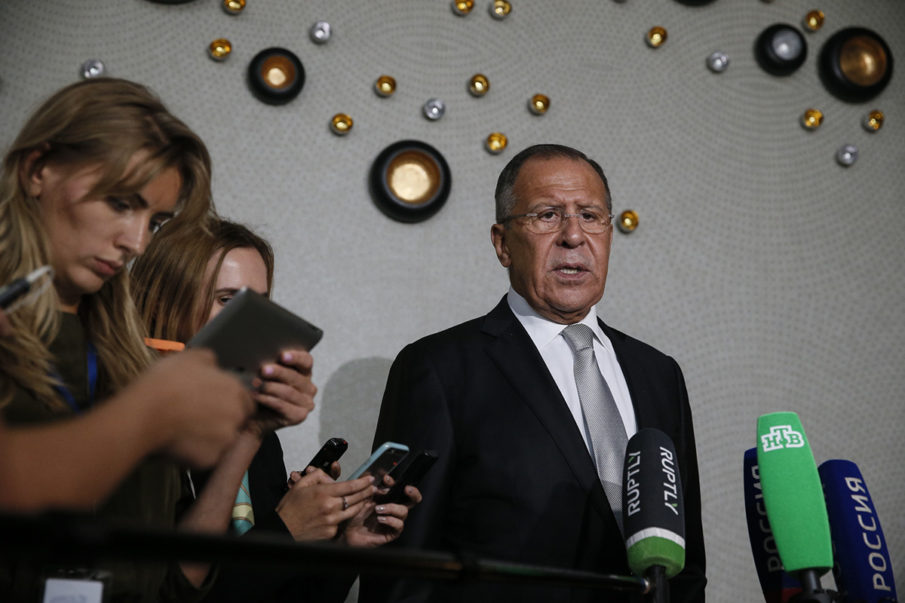After President Trump spoke before the UN assembly on Tuesday, Russian Foreign Minister Sergei Lavrov told reporters that Russia is “extremely concerned” about the President’s statements regarding the Iran nuclear deal, North Korea and accused the United States of trying to force its influence on other nations.
Lavrov did applaud one portion of Trump’s speech, wherein the President emphasized that the United States recognizes and honors the sovereign rights of each individual nation. The Russian diplomat said that he and his constituents “have taken note” of the President’s declaration “that the United States does not seek to impose its way of life on anyone and that it respects the right of every other sovereign nation to determine its future, or form of government. As I said, it was a remarkable statement. Now we will see whether these words are translated into action.”
His praise of the U.S. President ended there, however, accusing Trump of “demonizing” Kim Jong un’s North Korean regime, whereas the Russian government, according to Lavrov, seeks solutions.
Our position of principle is that we do not demonize anyone but try to get to the bottom of the problem. Some are concerned about their security, others are focused on developing relations with their neighbors, and still others are dealing with an internal conflict. Condemnation and threats will only antagonize the countries that we want to influence. Therefore, we prefer to work with all concerned parties, to encourage them to enter into a dialogue, both regarding domestic conflicts or problems like the nuclear threat on the Korean Peninsula.” Lavrov said.
Those remarks are, of course, telling. China and Russia have continued to drag their feet in regard to finding ways to deal with Kim Jong un’s pursuit of nuclear weapons and more advanced ballistic missile platforms. Russian President Vladimir Putin said he did not believe sanctions were the answer to the North Korea quagmire two weeks ago during a press event in Russia, and his nation has continued to increase trade with North Korea as tensions have risen. It’s clear that, among the qualifiers laid out by Lavrov, Russia is the “neighbor” that is focused on developing relations, and China, who would likely see a massive wave of North Korean refugees streaming across its border if war were to break out, is the nation concerned about security.
Lavrov went on to counter President Trump’s assessment of the Iranian nuclear deal, which was brokered between Iran and six other nations, meaning it isn’t up to the United States alone to determine how effective it has been.
We will rely on the professional assessment provided by the IAEA, whose director general has said more than once that Iran is faithfully implementing its obligations. We will uphold this document and the consensus, which the international community happily accepted and which has strengthened regional security, as we see it, as well as broader international security.”
Lavrov also addressed the possibility of the United States’ withdrawal from the Reagan era INF Treaty, which mandated that the United States and Russia do away with their short and intermediate range nuclear missiles. The United States has reportedly been developing a nuclear tipped cruise missile intended to keep its aging B-52 bomber’s leg of the nuclear triad functional despite its aging air frame.
As President Vladimir Putin has said, Russia is interested in preserving the treaty, but, of course, providing that our American partners do not violate it. We have suspicions regarding at least three points that the Americans are creating weapons that violate or could violate the responsibilities they undertook under the treaty. We openly expressed our concern; the Americans also have grievances against us but they cannot explain what exactly caused their concern.”
Lavrov’s assessment of the United States’ grievances against Russia, like his characterization of Russian military action in Ukraine, was characteristically skewed, including his seeming enthusiasm for the Minsk Agreements, which NATO has been pressuring Russia to follow for years. The United States has placed sanctions on Moscow because, although it signed the agreement in 2014, Russia has yet to fully implement the agreed upon terms. Among other things, it would require the immediate withdrawal of Russian heavy weapons from the Ukraine region, and would force Russia to permit monitors into Ukraine’s Donbas area.
“We have reaffirmed our commitment to these agreements that must be implemented in full.” Lavrov said of the now three-year-old agreement.
Already have an account? Sign In
Two ways to continue to read this article.
Subscribe
$1.99
every 4 weeks
- Unlimited access to all articles
- Support independent journalism
- Ad-free reading experience
Subscribe Now
Recurring Monthly. Cancel Anytime.


COMMENTS